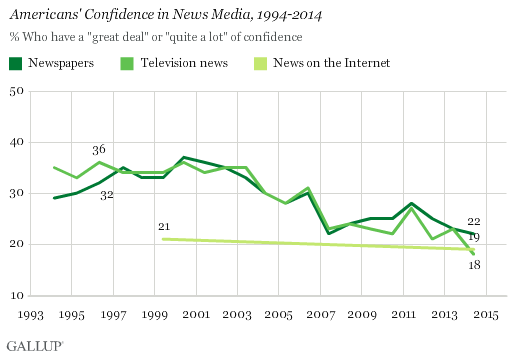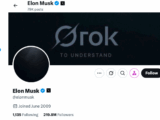ANALYSIS –
By Glynn Wilson –
Public confidence in the news media in America continues to post record lows in public opinion surveys, according to the latest Gallup poll on the subject.
And while the public’s confidence in television news and newspapers continues to decline to record lows, the amount of crap being passed off as news on the Web is also not exactly inspiring great public trust. Too bad Gallup does not probe with more depth to find out which news sources people actually use and trust.
Confidence in newspapers has declined by more than half since its 1979 peak of 51 percent, while TV news has seen confidence ebb from its high of 46 percent in 1993, the first year Gallup asked the question. Gallup’s only previous measure of so-called “Internet news” was in 1999, when confidence was 21 percent, “little different from today,” although this measure is clearly flawed by the way Gallup asks the question.
It is clear from this report that even the pollsters at Gallup do not know the difference between the Internet and the World Wide Web. The issue is not “news from the Internet.” Newspapers and television news stations all have Websites now, and some people continue to get their news from traditional, mainstream news organizations on the Web and through social networking platforms such as Facebook and Twitter. They does not necessarily mean they have found and use alternative, independent sources of news designed specifically to better educate the public on what’s really going on, like this news site.
Partisan Differences
Slightly less than one-fifth of self-identified conservatives, 15 percent, say they have a great deal or quite a lot of confidence in newspapers, a number that is tied with the 10-year low.
“In the past decade, the percentage of conservatives expressing a strong degree of confidence in newspapers has fallen by nearly half,” Gallups says.
What they don’t tell you is that this is not surprising considering the pounding newspapers have taken for years on talk radio and conservative television infotainment networks like Fox News, where commentators continue to try to convince a certain segment of the public that newspapers are “liberal.” It is a myth, but clearly many conservatives believe this and are not afraid to bash newspapers when public opinion pollsters call.
Liberals are far more likely than conservatives — or than the adult population in general — to be confident in newspapers. Thirty-four percent of liberals say they have “a great deal” or “quite a lot” of confidence in newspapers, but they must be talking to people who read papers such as the New York Times, the Washington Post or others in urban areas where there is still a daily newspaper doing some service by continuing to cover local news.
Nearly a quarter of moderates, 24 percent, meanwhile, say they have confidence in newspapers for news, but this does not indicate whether they are still reading them in print or online.
While liberals are more likely to have confidence in newspapers than conservatives, conservatives are slightly more likely to express confidence in TV news, 19 percent, than liberals, 15 percent. But again this probably indicates conservatives are talking about Fox News or perhaps their local television news station, where some people still turn for news about the weather, sports, local crime and such.
For liberals, this 2014 reading represents an 11-percentage-point decline from 2013, which may indicate that more educated liberals are tired of the sensational garbage that passes for news on cable and network television. Many have turned to alternative, independent sources of news on the Web.
Over the past year, according to Gallup, “the Internet” has seen the acceleration of website-only news sources that focus on empirical, data-driven analysis, including Ezra Klein’s Vox website or the relaunching of Nate Silver’s FiveThirtyEight site.
“But this quantitative approach to telling the news has not, in of itself, persuaded the major ideologies to express strong confidence in news from the Internet,” according to Gallup, a strange statement since chances are most people have never heard of this. What people are turning to are alternative, independent news sites like Politico and the New American Journal.
More than a fifth of liberals, 22 percent, and moderates, 22 percent, say they have a great deal or quite a lot of confidence in news from the Internet, while slightly fewer conservatives, 17 percent, say this.
Bottom Line
“The field of news media has changed dramatically since Gallup first began measuring the confidence the public held in newspapers or TV news decades ago,” Gallup says in its analysis of the data. “The circulation of newspapers continues to shrink to the point that University of Southern California’s Annenberg Center for the Digital Future estimates that most print newspapers will not exist in five years.”
That corresponds to my own research. I made a speech at the Birmingham Southern Writer’s Conference in the year 2000 saying daily newspapers would not be tossing the physical paper at peoples’ doorsteps by the year 2019. Since Newhouse shuddered all of its daily papers in the state’s where it held near monopolies, including Alabama, this is already true. But chances are no print editions will still be circulating by home carriers by 2020.
“Television news continues to see a proliferation of new cable news networks, including the launch of Al-Jazeera America in August 2013,” Gallup points out. “News published on the Web and accessed through the Internet now figures prominently in the average American’s news diet, whereas not so long ago this mode (of communication) did not even exist.”
Amid this rapid change, Americans hold all news media platforms in low confidence, according to Gallup.
“How these platforms can restore confidence with the American public is not clear, especially as editorial standards change and most outlets lack the broad reach once available to major newspapers and broadcasters,” Gallup says, an indication that the polling outfit really does not understand news reading habits of news consumers in the era of the Internet. The World Wide Web is global. Not local. There are serious professionals engaged in redefining what constitutes news and delivering it on the Web and building the economy to support it. The people will eventually have no choice but to come around and use the new technology.
Survey Methods
Results for this Gallup poll are based on telephone interviews conducted June 5-8, 2014, with a random sample of 1,027 adults, aged 18 and older, living in all 50 U.S. states and the District of Columbia. For results based on the total sample of national adults, the margin of sampling error is plus or minus 4 percentage points at the 95 percent confidence level.














